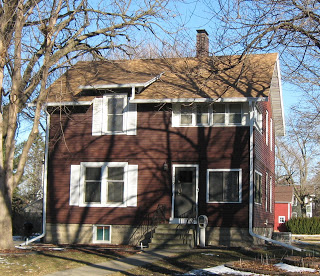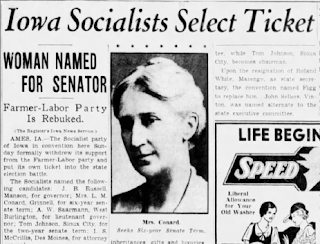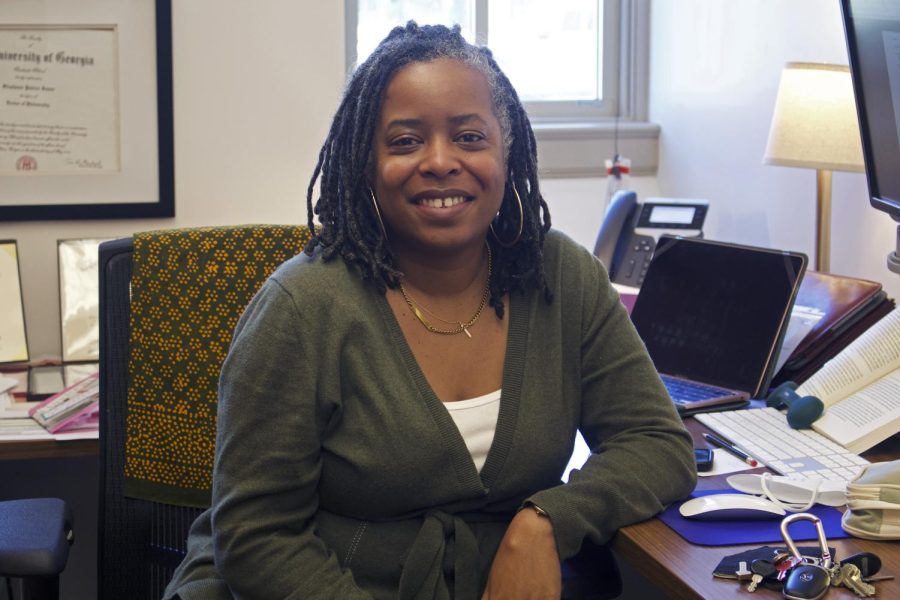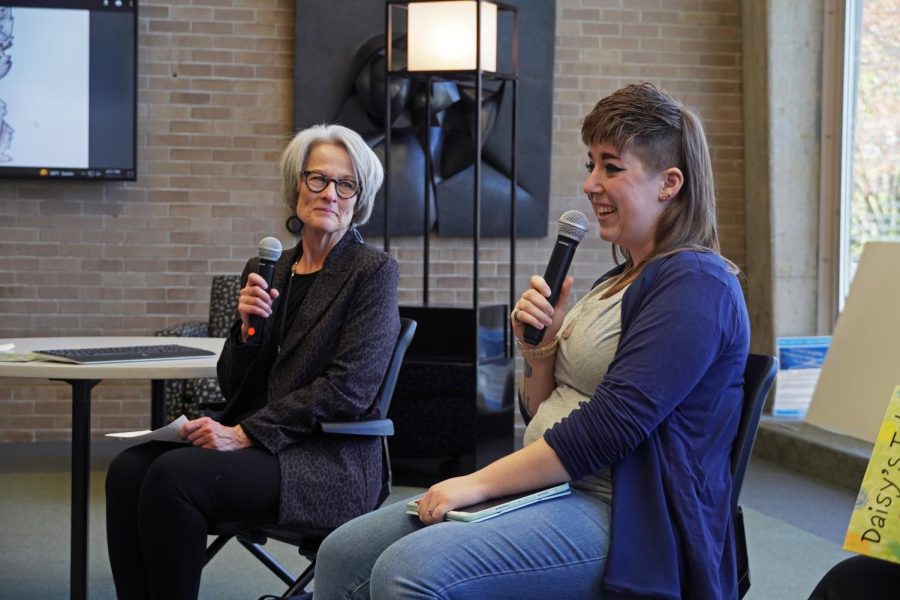“Capitalism and War Inevitable,” reads the Jan. 4, 1933 Scarlet & Black headline. The author, unnamed, begins by quoting Laetitia Moon Conard, a lecturer of sociology and economics for Grinnell College:
“Capitalism is only concerned with profits, while socialism strives towards service and the good welfare of the people. Under capitalism, because of private and self-seeking ownership, extreme poverty and extreme wealth, depressions every few years, unemployment, and war are inevitable.”
Such rhetoric, regarded as radical for its time, was common for Conard. A life-long social justice advocate, she frequently appeared on Iowa ballots for the Socialist Party. Over the course of her life, Conard was not one to back down from speaking about or acting upon her beliefs.
So who exactly was this trailblazer who defied gender norms before women even had the right to vote?
Elizabeth Laetitia Moon, later Laetitia Moon Conard, was born to Quaker parents on May 9, 1871 in Fallsington, Pennsylvania. After graduating from Westtown Friends Boarding School in 1889, she attended Smith College where she received her B.A. in 1894, and her M.A. in 1896.
Conard continued her studies at the Sorbonne in Paris from 1896-1897 and later received her Ph.D. in comparative religions from the University of Chicago in 1899, during a decade where only approximately 3.5 percent of women even graduated from high school.
In 1900, Laetitia Moon married Henry Shoemaker Conard, and in 1906 the couple moved from Pennsylvania to Grinnell, where Henry became a professor of botany at Grinnell College. The Conards lived at 1310 Elm St., where they raised three children — Elizabeth, who was born in Pennsylvania, and Rebecca and Alfred, who were both born in Iowa.
During her early years in Grinnell, Conard seems to have largely focused on caring for her children at home. However, by the 1920s, with her children substantially older and more independent, she started to get involved with the Grinnell community.
She participated in the founding of the First Friends Church in Grinnell and also taught at Uncle Sam’s Club, a Sunday school program for children in the poorer areas of Grinnell.
At the time, the women’s suffrage movement was in full force, particularly with the passage of the 19th amendment in 1920, which granted women the right to vote. Conard formed the League of Women Voters two times, the second time occurring after the club lapsed when Conard’s family went away for a year on sabbatical.
Conard also served as a board member for the Grinnell Social Services Committee during the 20’s and 30’s and was heavily invested in fighting poverty in the community.

Susan Ferguson, professor of sociology at Grinnell College, conducted extensive research on Conard’s life and works with the help of Katie Mears `13.
In her research, Ferguson writes, “It was said that she [Conard] knew what every poor person on the south side of town ate for breakfast, if they ate anything at all.”
While still engaged in community work, Conard became more active politically and began campaigning for Progressive Party presidential candidate Robert La Follette in 1924. An S&B article written on Sep. 27, 1924 noted Conard as the “acting chairman” of the county committee for La Follette’s campaign.
After attending Columbia University from 1925-26, Conard returned to Grinnell with a graduate degree in economics and sociology, which, in addition to her PhD from the University of Chicago, allowed her to join the College faculty. At Grinnell, Conard began her work in the economics department, but soon started teaching lectures on Introduction to Sociology, Social Origins and Social Control.
Sociology did not become an official major at the College until 1935 and existed solely as a minor in the economics department up until that point. Ferguson regards Conard’s role as one of the first teachers of sociology at the College as instrumental in turning sociology into a respected discipline at Grinnell.
Conard also became involved with the American Sociological Society and the National Council of Family Relations in the early 1930s.
During the 1930s, Conard’s life was largely characterized by her own political career. In 1932, she was nominated to run for governor of Iowa on the Socialist Party ticket and was the sole female candidate on the ballot.
The Daily Iowan wrote in September 1932 that in a talk given by Conard at the Johnson County Courthouse, she argued that, “Socialism places human welfare above property rights. The old parties claim that the nation belongs to financiers, but we say it belongs to the workers with brain and muscle, and those who are looking for work.”
Though Conard was not elected governor, her political career was far from over. In 1934, Conard was nominated to run for Iowa’s Fifth Congressional District, which then included Grinnell and Poweshiek County. Like her run for governor, Conard again came up short when the results of the election were tallied and she finished with 0.3 percent of the final vote.

Despite her two losses, Conard’s tireless attitude prompted her to be nominated by the Socialist Party yet again, this time in 1936, to run for a seat in the U.S. Senate. Daniel Kaiser, professor emeritus at Grinnell College, researched the life and legacy of Conard for his blog “Grinnell Stories”. He wrote that, if elected, Conard promised that the Socialist Party “would solve the three great problems bequeathed to society by capitalism: inadequate food, clothing and housing for the masses; industrial autocracy; and the prevalence of war and militarism.”
Conard received a total of 1,233 votes in the senate election, losing to Democratic Iowa governor Clyde Herring, who had also beaten her in the governor’s race of 1932. Though an official historical confirmation was never achieved, Kaiser notes in his research that Conard was “apparently the first woman to stand for election” in each of the three political campaigns she ran.
Following her political career, Conard continued to teach at the College, often incorporating her own political beliefs into her sociology courses and encouraged her students to engage in fieldwork as a method of understanding social problems, particularly poverty, in Grinnell.
After 15 years with the Grinnell College faculty, Conard retired in 1941 at the age of 70.
“Teacher of Sociology Contributed Services Voluntarily for 15 years,” wrote The S&B on Wednesday, March 26, 1941. “Laetitia Moon Conard has the added distinction of having contributed her services without regular salary… She has taught economics and sociology, at the same time carrying on an active life in public and social welfare work.”
Conard was never hired as a professor despite her instrumental role in founding sociology at the College, instead serving as a volunteer lecturer of sociology during her years at the College.
In that same March 1941 article, the S&B refers to Conard as “Mrs. Conard” in the headline, rather than her well-deserved title of ‘Dr.’ This was just one example of the sexism that Conard faced throughout her career, in an age when the faculty at nearly every college was overwhelmingly male.
At a celebratory dinner for the 1941 retirees, male professors like Edward Steiner were applauded for careers based in “honor, dignity and courtesy,” while Conard was praised for being, “a good wife, friend, and teacher.”

“The attitudes of the academy or the society at large certainly at that time didn’t make much room for women who were independent as Conard was,” explained Kaiser.
Conard’s husband, Henry, has received significantly more attention and commemoration from the College. The Conard Environmental Research Area, a 365-acre field station located in Jasper County and owned by Grinnell College, is named after Henry Conard, not Laetitia.
“We need to right the kind of wrong here where her life and contributions and accomplishments have been overshadowed by those of her husband at the College,” said Ferguson. “I was trying to bring her voice and personhood back to life for the department.” Ferguson later added that she completed her research for the benefit of the broader campus as well.
“I’m thinking it would be kind of cool for the department to set up a scholarship or something in her honor if we could acquire funds,” said Ferguson. “I think that would also be cool to recognize her legacy.”
Conard died on Nov. 29, 1946, and is buried at Westfield Cemetery, a short drive from the Grinnell College campus.
“Why we should be remembering these women at Grinnell right now is [because] their voices and their contributions get forgotten,” said Ferguson. “To know that this highly educated progressive woman helped develop the Sociology Department and then contributed greatly to social justice movements in town and the state of Iowa — the political landscape in the state of Iowa — is amazing. She should be celebrated. She should be known.”
Susan Ferguson’s research on Conard can be found here, Daniel Kaiser’s here and more information about Dorrie LaLonde’s work, who researched Conard for the Grinnell Historical Museum, can be seen here.

























































